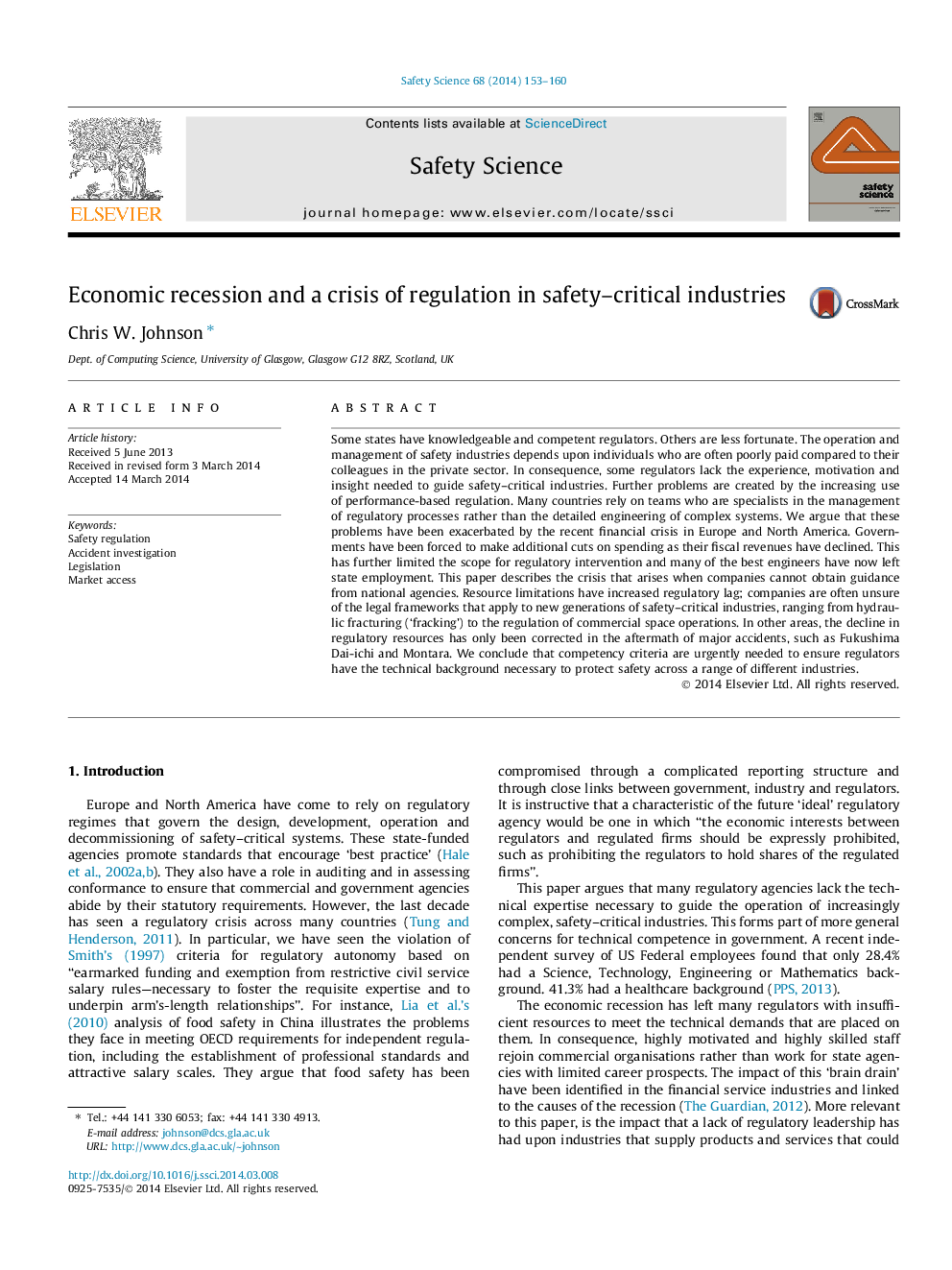| کد مقاله | کد نشریه | سال انتشار | مقاله انگلیسی | نسخه تمام متن |
|---|---|---|---|---|
| 6976236 | 1453402 | 2014 | 8 صفحه PDF | دانلود رایگان |
عنوان انگلیسی مقاله ISI
Economic recession and a crisis of regulation in safety-critical industries
ترجمه فارسی عنوان
رکود اقتصادی و بحران تنظیم در صنایع مهم بحرانی
دانلود مقاله + سفارش ترجمه
دانلود مقاله ISI انگلیسی
رایگان برای ایرانیان
کلمات کلیدی
مقررات ایمنی، تحقیق در حوادث، قانون گذاری، دسترسی به بازار،
ترجمه چکیده
برخی از ایالت ها دارای تنظیم کننده های متخصص و صالح هستند. دیگران شانس کمتری دارند عملیات و مدیریت صنایع ایمنی بستگی به افرادی است که اغلب نسبت به همکاران خود در بخش خصوصی به میزان کم پرداخت می شوند. در نتیجه، برخی تنظیم کننده ها از تجربه، انگیزه و بینش مورد نیاز برای هدایت صنایع ضروری ایمنی برخوردار نیستند. مشکلات بیشتر با افزایش استفاده از تنظیمات مبتنی بر عملکرد ایجاد می شود. بسیاری از کشورها بر تیم هایی متمرکز هستند که متخصصان مدیریت فرایندهای نظارتی هستند و نه مهندسی دقیق سیستم های پیچیده. ما استدلال می کنیم که این مشکلات توسط بحران مالی اخیر در اروپا و آمریکای شمالی تشدید شده است. دولت ها مجبور به کاهش بیشتر هزینه ها شده اند به این دلیل که درآمد مالی آنها کاهش یافته است. این امر دامنه مداخله نظارتی را محدود کرده است و بسیاری از بهترین مهندسان در حال حاضر مشاغل دولتی را ترک کرده اند. این مقاله بحران را نشان می دهد که زمانی رخ می دهد که شرکت ها نمی توانند از سازمان های ملی راهنمایی بگیرند. محدودیت منابع باعث افزایش تاخیر قانونی می شود؛ شرکت ها اغلب از چارچوب قانونی که برای نسل های جدید صنایع مهم ایمنی اعمال می شود، از جمله شکستگی هیدرولیکی ("شکستن") تا تنظیم عملیات تجاری فضایی است. در مناطق دیگر کاهش در منابع نظارتی تنها پس از حوادث بزرگ مانند فوکوشیما دایچی و مونتانا تصحیح شده است. ما نتیجه گرفتیم که الزامات صلاحیت ضروری است تا اطمینان حاصل شود که رگولاتورها دارای زمینه فنی لازم برای حفاظت از ایمنی در سرتاسر صنایع مختلف هستند.
موضوعات مرتبط
مهندسی و علوم پایه
مهندسی شیمی
بهداشت و امنیت شیمی
چکیده انگلیسی
Some states have knowledgeable and competent regulators. Others are less fortunate. The operation and management of safety industries depends upon individuals who are often poorly paid compared to their colleagues in the private sector. In consequence, some regulators lack the experience, motivation and insight needed to guide safety-critical industries. Further problems are created by the increasing use of performance-based regulation. Many countries rely on teams who are specialists in the management of regulatory processes rather than the detailed engineering of complex systems. We argue that these problems have been exacerbated by the recent financial crisis in Europe and North America. Governments have been forced to make additional cuts on spending as their fiscal revenues have declined. This has further limited the scope for regulatory intervention and many of the best engineers have now left state employment. This paper describes the crisis that arises when companies cannot obtain guidance from national agencies. Resource limitations have increased regulatory lag; companies are often unsure of the legal frameworks that apply to new generations of safety-critical industries, ranging from hydraulic fracturing ('fracking') to the regulation of commercial space operations. In other areas, the decline in regulatory resources has only been corrected in the aftermath of major accidents, such as Fukushima Dai-ichi and Montara. We conclude that competency criteria are urgently needed to ensure regulators have the technical background necessary to protect safety across a range of different industries.
ناشر
Database: Elsevier - ScienceDirect (ساینس دایرکت)
Journal: Safety Science - Volume 68, October 2014, Pages 153-160
Journal: Safety Science - Volume 68, October 2014, Pages 153-160
نویسندگان
Chris W. Johnson,
